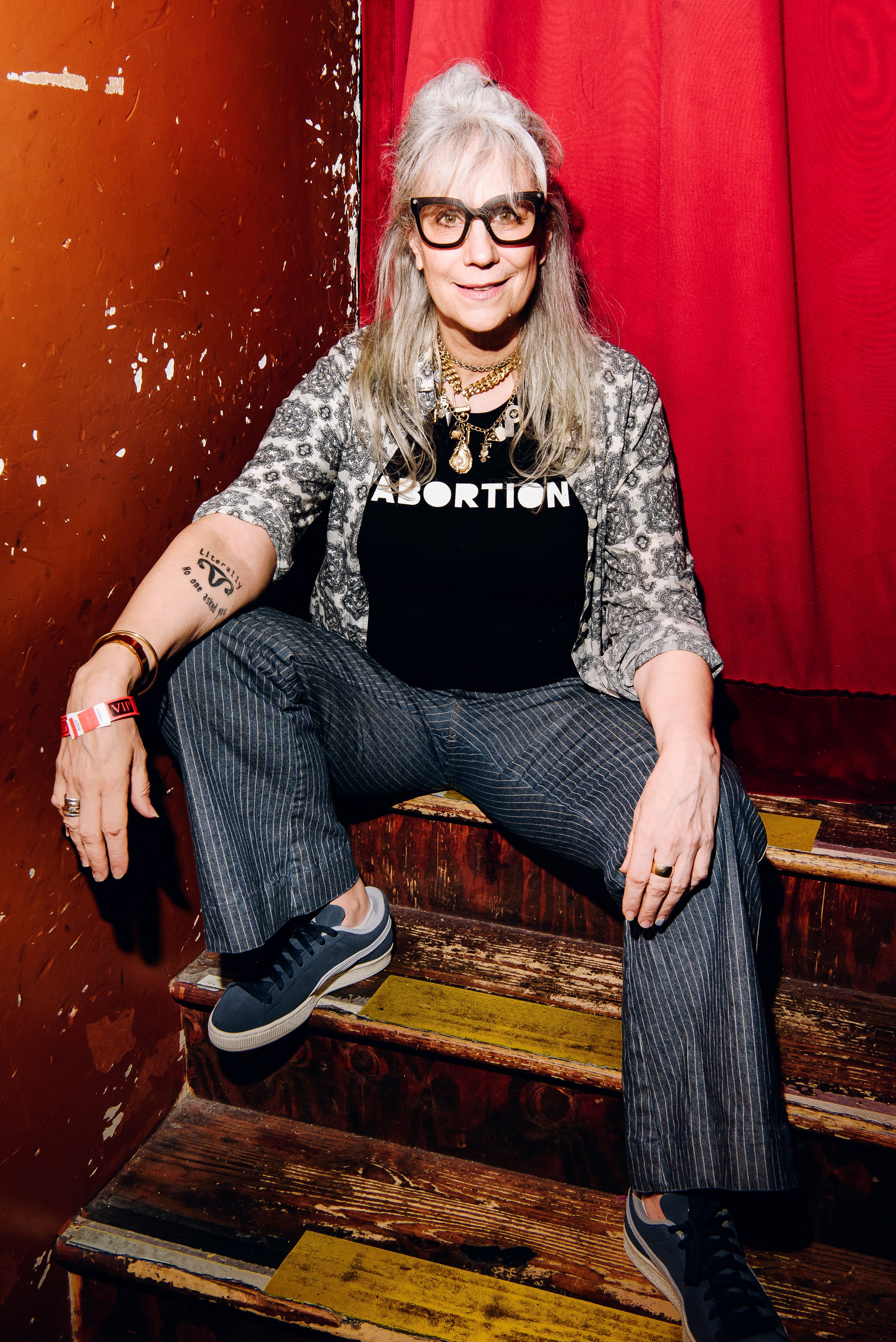June 24, 2022, was a dark moment in American history: Millions of women lost the right to a legal abortion when the Supreme Court overturned Roe v. Wade. Bans were triggered in Alabama and Texas, and 21 states now restrict the procedure more tightly than they did under the prior Roe standard, forcing pregnant women who need lifesaving care into dire medical odysseys. The harsh ramifications of the Dobbs decision make it a day deserving of commemoration through…comedy?
Yes, but only if that incisive levity is supplied by Lizz Winstead, a cocreator (with Madeleine Smithberg) of The Daily Show. She is the centerpiece of the harrowing and hilarious documentary No One Asked You, which will be screening in eight locations on June 24, a date Winstead and her colleagues in the Abortion Access Front are calling “the Overturniversary.” Many of the screenings are taking place in states where abortion has effectively become illegal or will be on the ballot this fall—and one screening will be in Jackson, Mississippi, where the state’s last abortion clinic was central to the Dobbs ruling.
Winstead has been mixing stand-up and activism since 1989. In 2015, she founded what was originally named Lady Parts Justice League as a vehicle to channel outrage, raise money, train activists, promote safe and easy access to reproductive care, and “kick the government out of your pants.” “Plus,” Winstead says, “becoming the abortion comedian is a great career move. Super lucrative, your phone never stops ringing with job offers, and you’re going to make millions of friends.”
Well, hundreds of friends, at least. One crucial element of Winstead’s work, chronicled in the film, has been traveling to dozens of abortion clinics—everywhere from Little Rock, Fort Worth, and Atlanta to Louisville, Tuscaloosa, and Detroit—to lift the spirits of beleaguered staffers. Sometimes that involves staging a happy hour comedy show; other times it means planting trees that brighten up a clinic’s grounds and block the view of antiabortion protesters. “I started this organization because there was a massive hole in this movement. There wasn’t an advocacy group that was checking in, especially on the independent providers, to see how they’re doing,” Winstead says. “People do this work and don’t tell their families, because their families would disown them or be angry. The appreciation I got for showing up with, like, cupcakes was too much. I thought, There’s something terribly wrong here.”
No One Asked You took six years to make, and over the course of filming, things go from terribly wrong to worse. The cameras follow Winstead and her troupe’s visits to Jackson, Mississippi’s Pink House, the clinic that—in a stroke of good cinematic luck, albeit public policy disaster—would become the losing plaintiff in the Dobbs case. “At the time we started shooting, we did not know that would happen,” says Ruth Leitman, the documentary’s director. The accumulating legal gloom is pierced, however, by the charismatic heroism of the film’s inadvertent second star, Derenda Hancock, the drawling, cowboy-hatted coordinator of the Pink House Defenders, a volunteer group that escorts patients into the clinic. In a film full of professional funny people, Hancock delivers probably the most bitterly funny line, quietly telling a vicious antiabortion protester, “You are so crazy.”
One of the documentary’s greatest strengths is that it takes abortion out of the abstract ideological shout-fest and humanizes the issue through portraits of people like Hancock. That accomplishment is closely related to one of Winstead’s key insights: that talking bluntly—and joking smartly—about abortion is politically powerful, because it weakens the stigma that opponents use as a weapon. “We have politicians who have 50 years of not knowing how to talk about it,” Winstead says. “‘Don’t say ‘abortion’—say ‘reproductive rights.’ So the antiabortion movement says the word four times more than we do. Everyone’s been too afraid. We just decided to rip the Band-Aid off and take the hits.” Winstead herself has never been shy about discussing her own teenage abortion ordeal, both onstage and in essays. When Leitman met Winstead in 2012, the two women found they shared a painful bond. “At the very same time Lizz was having an abortion, trying to escape an abusive relationship with her high school boyfriend in Minnesota, I was doing the exact same thing in Philadelphia,” Leitman says. “It hit me so much. I would not be talking to you if I had not had that abortion.”
Post-Dobbs, Leitman and Winstead are encouraged—somewhat—by the fact that voters have been turning out to reject antiabortion referenda. However, “at the same time initiatives have been defeated, they’ve also voted back in some of the assholes who write the laws,” Winstead says. “How does this work?” She is not waiting around to find out. After their “Overturniversary” events, Winstead and Leitman will be taking the road show to the Democratic National Convention in Chicago, complete with a variety revue called “A Cavalcade of Cooch” and singers dressed as giant mifepristone pills.
Winstead’s style is a significant, and welcome, departure from what’s typical of Democratic outreach. “These political groups talk about, ‘We’re going to put $100 million into a reproductive rights campaign leading up to the election,’” she says. “And who’s going to curate that for you? ‘Other Beltway people.’ Oh, good.” Those insiders might be wise to consult a woman who has spent decades out in the abortion trenches, finding creative ways to motivate real people to take action.
More Great Stories From Vanity Fair
RFK Jr.’s Family Doesn’t Want Him to Run. Even They May Not Know His Darkest Secrets.
In the Hamptons, Wealthy Biden Donors Fear a “Dark” Future Under Trump
An Epic First Look at Gladiator II
Palace Insiders on the Monarchy’s Difficult Year
Donald Trump’s Pants-Pissingly Terrifying Plans for a Second Term
I Taught the Taylor Swift Class at Harvard. Here’s My Thesis
The Best Movies of 2024, So Far
Score New VF Merch With the Fourth of July Deal at the VF Shop

